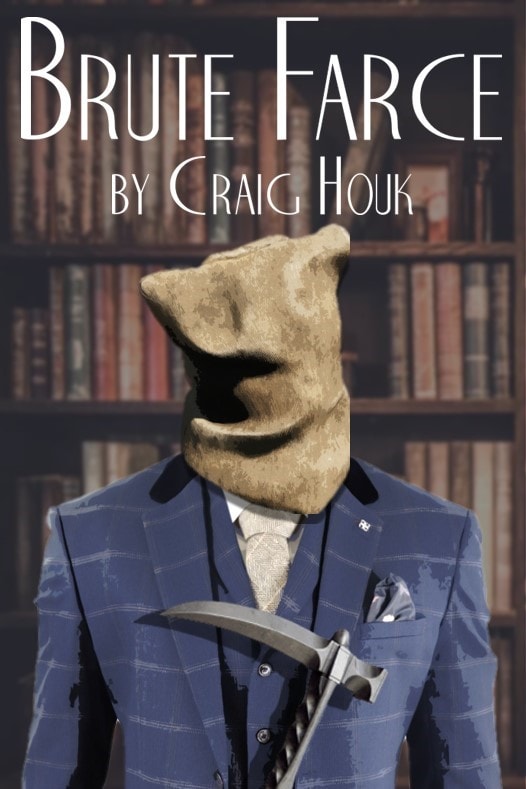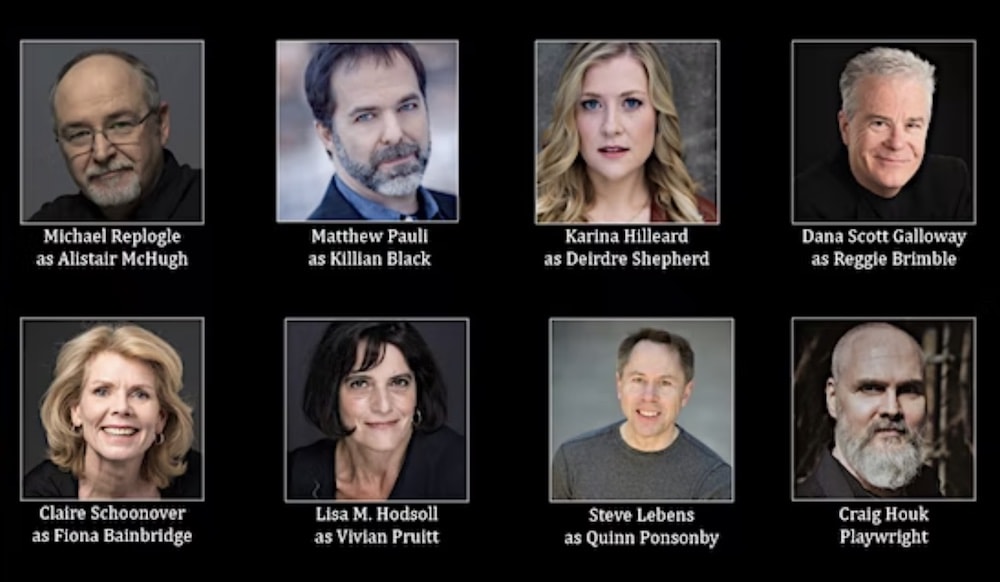DC Theater Arts doesn’t often report on staged readings (and never reviews them), but the premise of this one was too delicious to pass up: “Four vengeful, narcissistic actors, with the assistance of a brutish stage manager and a cynical stagehand, abduct and hold captive a theater critic notorious for shutting down productions and ending careers through his malicious reviews.”
Craig Houk’s original comedy Brute Farce has a veddy British Noises Off and The Play That Goes Wrong vibe about it. Set in “a careworn, scarcely professional, Provincial Theatre in England,” the play sends up not only the venality of the theater critic in question but also the daft vanity of actors.
Houk’s description of the two-level set promises silliness in extremis: “A cramped and unkempt Trap Room which has been converted into a Dressing Room…. Above the Trap Room is the Stage upon which sits a posh 1920s Study, serving as the set for the play within…. A trap door on the Study floor opens into the Trap Room below.”
At rise, the much-unbeloved critic, Alistair McHugh, is manacled in the trap room. It will shortly be established that a cockamamie plan has been hatched to kill him during a play within the play. A disgruntled actor coincidentally named Killian has masterminded the murder, which involves swapping Alistair into the play as a character who normally has a bag put over his head and is fake-punctured with a retractable horseman’s pick — except this time, with Alistair in the role of corpse-to-be, the horseman’s pick will be lethal. It soon becomes apparent that as accomplices go, the other three actors — the lush Quinn, the egocentric Vivian, and the narcoleptic cokehead Fiona — are a hopelessly bumbling bunch. To Killian’s consternation, they’ve lost the plot. Killian urges them to focus on the threat that Alistair poses:
KILLIAN: He’s been relentless in his efforts to undermine and, at times, completely shut down any production that doesn’t suit his impossible standards. And he’s been particularly vicious as it relates to each of us, repeatedly castigating us in his reviews, with the concerted goal of putting an end to our stage careers.
Thus the setup is ripe for hilarious dialog:
ALISTAIR. What can I say? I’m a theatre critic who lives for bad theatre. It’s my one weakness. I exist because there are actors out there who are profoundly self-aware, and who are grateful to hear the truth. And I persist because there are actors out there — like you lot for example — who take me too seriously when you shouldn’t.
VIVIAN. Oh, is that a fact? Do you know, there are mental institutions full to the brim with actors who have taken critics seriously?
ALISTAIR. On behalf of reviewers all over the globe, I’m honored.
…
VIVIAN. Your reviews are unreasonably harsh. And I’ll accept that though it is the responsibility of the theatre critic to be critical, it doesn’t mean that the critic should take pleasure in being cruel.
ALISTAIR. I don’t take pleasure in being cruel. It’s simply a by-product of years and years of exposure to dreadful scripts, second-rate productions, and vomit-inducing performances.
For anyone who’s worked backstage or on-, there are inside jokes aplenty, especially prompted by the seen-it-all stage manager Deirdre and her overwhelmed assistant Reggie. In what has to be one of the funniest props in theater lore, Reggie has rigged an elaborate electrical cueing system involving four colored light bulbs, one for each actor, and four clear light bulbs, one for each scene. The actors all being themselves dim bulbs, the device results in complete confusion.
Judging from an exceptionally well-done staged reading I attended the other night at Anacostia Arts Center, the first act of Houk’s comedy is a near-perfect, laugh-out-loud farce, owing not only to the cockamamie plot but to the comic invective among the bungling actors, harried production crew, and acerbic critic. The show’s synopsis calls Brute Farce “a satirical commentary on the perpetually symbiotic, oftentimes dysfunctional, and occasionally turbulent relationship between actors and reviewers.” And it spares no one.
Throughout Act One that trap door between upper and lower levels keeps accidentally dropping open, a sight gag that presages the goings on in Act Two, when a melodramatic play within a play takes place above intercut with scenes involving the constrained critic in the room below. I felt the comedic momentum go out of the play during the second act, when the focus shifts to the more conventionally unconventional play-within-the-play while the brilliant throughline about offing the critic gets short shrift.
As someone who sometimes plays the part of theater reviewer myself — and as one who believes no critic is above criticism — I thoroughly enjoyed Act One, and I suspect a stronger Act Two could be devised that would turn Brute Farce into a future theater-laughs-at-itself classic alongside Michael Frayn’s Noises Off.
Brute Farce by DC-based playwright Craig Houk is receiving four staged readings (October 27, 28, and 29, 2022) at the Anacostia Arts Center, 1231 Good Hope Road SE, Washington, DC. For additional information on these readings and to purchase tickets ($10), go online.
Running Time: Two hours and 5 minutes, including one intermission.
Brute Farce
Written by Craig Houk
Directed by Lisa M. Hodsoll
Assistant Director: Craig Houk
CAST
Michael Replogle: Alistair McHugh
Matthew Pauli: Killian Black
Karina HiIIeard: Deirdre Shepherd
Dana Scott Galloway: Reggie Brimble
Claire Schoonover: Fiona Bainbridge
Lisa M. Hodsoll: Vivian Pruitt
Steve Lebens: Quinn Ponsonby
Colin Davies: Stage Directions
PRODUCTION TEAM
Production Stage Manager: Laura Schlachtmeyer
Light Designer: Christian Jones
Sound Designer: Craig Houk






